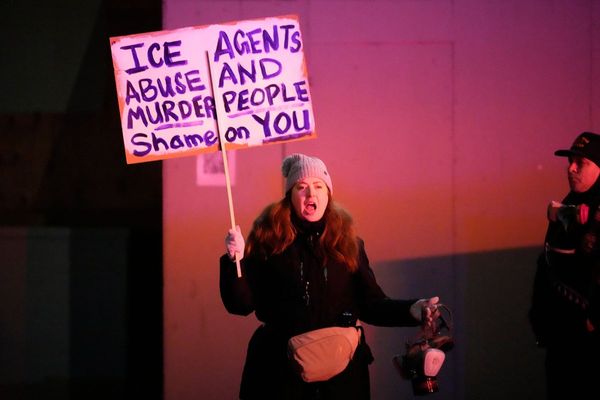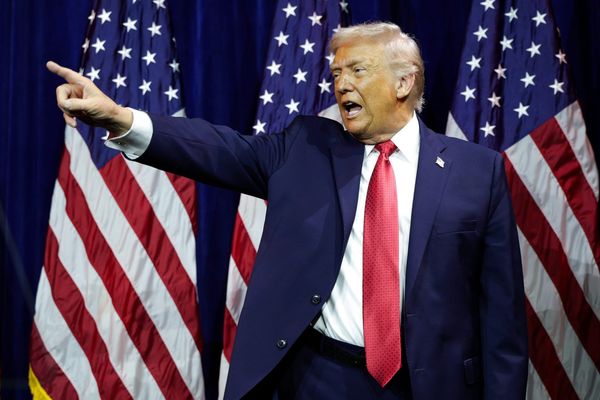
Cyril Ramaphosa has sought to shore up his shaky mandate as the new president of the African National Congress (ANC), saying the party will emerge “united, renewed and confident” from the fractious conference that elected him leader.
“The doomsayers said this conference was going to collapse … and we’ve proven for the millionth time in 105 years of existence that the ANC is able to rise even above its own strengths,” he said on Tuesday.
Few doubt the scale of the task Ramaphosa faces. The ANC has been tarnished by repeated corruption scandals and its failure to deliver the improvements in quality of life that many hoped would follow the end of the racist, repressive apartheid regime 23 years ago. Though it still dominates the political landscape, the party’s popularity is fast declining.
If, as seems highly probable, Ramaphosa is elected president of South Africa in polls scheduled for next year, he will need to invigorate a flagging economy, reassure investors, placate millions of increasingly impatient young people who care little for the potent history of Africa’s oldest liberation party, root out systemic corruption and unite a nation that remains profoundly segregated.
His victory on Monday, by a margin of 179 votes out of 4,708 cast by delegates, was marred by the failure of key allies to win roles on the party’s decision-making body, but supporters believe Ramaphosa has the talent, charisma, and grit to succeed.
“He has got what it takes. He knows about business … but he’s also a man of the people. He won’t take from the poor. Many things will change now,” said Ntapelo Nchabeng, 34, a teacher in a poor Soweto neighbourhood less than a mile from where Ramaphosa was born.
Ramaphosa, the son of a police sergeant, was educated in Soweto schools. A brilliant student and deeply religious, he became the first in his family to go to university, where he hoped to qualify as a lawyer.
“Cyril and his closest friends were committed Christians and their religious beliefs were the basis for their political beliefs,” said Anthony Butler, a professor of politics at Cape Town University and biographer of the new ANC leader.
Ramaphosa was swept up in the Black Consciousness movement. Detained in 1974 by apartheid authorities and then in the crackdown that followed the Soweto uprising of 1976, he endured two terms of imprisonment that were “very painful psychologically”, Butler said.
In 1982 Ramaphosa founded the National Union of Mineworkers, which went on to play a key role in the struggle against apartheid. This made him one of the most influential leaders in South Africa.
With his rare mix of charm, intelligence and commitment, Ramaphosa rose rapidly through the ranks of the ANC and was chosen to head a team that negotiated with apartheid authorities. He was identified as a potential successor by Nelson Mandela, who became president of South Africa after free elections in 1994, but in time Ramaphosa became marginalised.
One of Cyril Ramaphosa’s biggest tasks as ANC leader will be to untangle an alleged web of corruption and influence-peddling that has been spun around the government.
At the heart of many of the allegations against the president, Jacob Zuma, is his relationship with the Gupta family, who emigrated from India in 1993 seeking business opportunities in post-apartheid South Africa.
In March last year, Zuma told parliament he rejected accusations that he had delegated control of the finance ministry to the immensely wealthy local tycoons.
But Zuma was on the defensive. Days earlier, the then deputy finance minister, Mcebisi Jonas, had said in a public statement that members of the Gupta family had offered him the ministerial post in December.
The Guptas denied the allegation, saying it was “totally false”.
Since then, the relationship between the Guptas and officials of the ruling party has rarely been out of the news.
Their close relationship with Zuma became clear when they flew hundreds of guests to a wedding near Johannesburg and were allowed to use a military airbase instead of usual civilian facilities. One of Zuma’s sons was a business partner of the Guptas.
Further details emerged just over a year ago in a report by Thuli Madonsela, then South Africa’s most senior anti-corruption watchdog, into alleged influence-peddling.
Earlier this year, more than 100,000 documents and emails were leaked to reporters which appeared to detail improper dealings in lucrative government contracts made with the Guptas.
Authorities launched an investigation into several allies of Zuma who have been linked to corruption at three state-owned companies. One of the allegations involves suspected kickbacks worth $411m (£316m).
The scandals have prompted many to talk of “state capture” – a process by which the country’s institutions and top officials have been corrupted by outside actors.
Speaking to the BBC in August, Atal Gupta said the claims against the family were based on misunderstandings and misinformation, and denied any wrongdoing. Zuma also denies all allegations of wrongdoing.
Bitterly disappointed, he left politics, levering his unique combination of mining and political connections to build a business empire. This made him extremely rich but alienated some supporters. “Cyril is a multibillionaire and he got it from the very same people who oppressed us,” said Billy Tsotetsi, 62, a TV commentator.
In 2012 Ramaphosa was caught up in the political fallout from the shooting of 34 striking miners by police – the so-called Marikana massacre. As a shareholder of the company at the centre of the dispute, he had called the protesters “criminals” and urged police to take action to end a standoff over pay and conditions.
Later that year he was elected deputy president of the ANC, and in 2014 he was appointed deputy president of the country.
Ramaphosa only recently distanced himself explicitly from the president, Jacob Zuma. Friends said the decisive moment came when Zuma fired a widely respected finance minister in March after revelations exposing the extent of corrupt patronage networks involving ANC officials. Many now expect Ramaphosa to move swiftly to force Zuma out of office and to fight graft.
This may be tougher than anticipated. If Ramaphosa greeted the first results read out on Monday night with a broad grin, others prompted a grimace. Three of the six most powerful positions in the ANC, including that of deputy president, will be filled by controversial figures close to his defeated rival, Nkosozana Dlamini-Zuma, and to Zuma himself.
Admirers believe Ramaphosa will win this battle too, though not through his charm and diplomacy. “I think we are about to see another side of Cyril Ramaphosa than the quiet, respectful party loyalist we have seen since 2012. I have witnessed the steely, almost ruthless, side of Ramaphosa … Ramaphosa’s election was indeed a critical turning point for South Africa,” wrote Max Du Preez, a South African columnist.
If Ramaphosa is worried about the battles to come, he did not show it on Tuesday afternoon. As he walked through the sprawling conference centre south-west of Johannesburg where delegates had gathered, he smiled, laughed and joked with vendors and ANC staff.
“Things are going extremely well. It cannot go any better,” he said.







